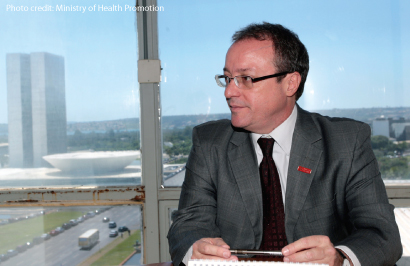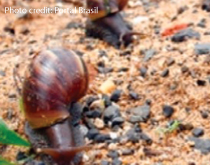
If you can not see this message correctly, click here.


Brazil is already considered a world leader in research on
neglected diseases and aims to further boost the production of knowledge in this field
Although the Federal Government announced a cut in the budget of the Ministry of Science, Technology and Innovation (MCTI) for 2012, Dr. Carlos Gadelha, the Ministry of Health's Secretary for Science and Technology and Strategic Inputs, ensures that there has never been so much investment in research. "In research alone (not including the production of innovation), the Ministry of Health's allocation of resources has increased from R$ 70 million to R$ 110 million. Investment in the production of innovation has quadrupled, from R$ 50 million to R$ 250 million", says Dr. Carlos Gadelha. "The total investment is approximately R$ 360 million", he confirms.
According to the Ministry of Health secretary, in 2012 about R$ 200 million (R$ 110 million from the Ministry of Health and the remainder from partners such as CNPq) is allocated for the development of studies, especially those that focus on combating tropical diseases: the so-called neglected diseases. "Of the estimated research budget this year, 20% is for the Bid Notice for addressing neglected diseases. This is an acknowledgment, from the viewpoint of research. Currently, the Ministry of Health is taking a leap in quality", says the secretary, recalling that they also support the production of inputs to combat these neglected diseases. "We have to produce a broad group of drugs, in order to combat and treat these diseases. Brazil is using its purchasing power and coordinating with the private sector to try to encourage it to invest", says Dr. Gadelha, who states that despite the increase in investment for research and innovation, the allocated resources are still far from ideal.
Read More [+]


If the results of tests on humans confirm research already carried out with mice, it will undoubtedly be a great achievement for mankind
Scientists at the Oswaldo Cruz Foundation (Fiocruz) in Rio de Janeiro, have discovered that the parasite that causes Chagas disease can be used to prevent another incurable disease: type 1 diabetes, which afflicts 1 million Brazilians. The discovery has yet to be tested in humans, but researchers are optimistic.
The discovery at Fiocruz happened by chance. While researching Chagas disease, scientists found that mice that received the parasite Trypanosoma cruzi in the laboratory did not develop diabetes, despite being genetically prone to the disease.
In the evaluation of Dr. Cleudson Nery de Castro, professor of infectious diseases at the University of Brasilia (UnB), this study can be considered an achievement, but he warns that the unprecedented research is still experimental. "I expect that researchers will find out how the T.cruzi protects the animals from diabetes type I. Beneficial effects in humans are still to be confirmed and this takes time", says...

According to the specialist, tuberculosis continues to pose a major public health
problem in Brazil
Ministry of Health data show that tuberculosis cases reported in the country in 2011 dropped 3.54% compared to the previous year: 69,245 in 2011 compared to 71,790 in 2010. But what caused such a drop? According to Dr. Tania Marcial, an infectologist at the Eduardo de Menezes Hospital in Belo Horizonte/Minas Gerais, it is important to emphasize that the data are for February 2012, which means they are still preliminary and subject to revision.
She explains that the major difference is that for the first time the rate has fallen below 70,000 new cases/year. "New cases are considered as the smear positive cases that have never received treatment for tuberculosis or that received treatment for less than 30 days. When the absolute number is analyzed, the drop is 3.54%, but when we analyzed the incidence rate, the drop is only 1.6%", she says.
According to the expert, it is more correct to analyze the data using the incidence rate – which is the number of new cases/100,000...


To expect that poor countries such as the ones in Africa, increase the percentage of their modest GDPs used for Research, Development and Innovation is certainly to conceal the problem of lack of a global system of governance
Researchers are calling for a global health convention that requires all governments to share the costs of research and development (R&D), by signing an international treaty, to increase access for communities that are least able to pay for medical innovation (usually those with the highest need).
In an interview with allafrica.com the policy and advocacy director of Medecins Sans Frontieres (MSF), Michele Childs, says that "the current model for funding R&D and the agenda-setting are flawed". She advocates the need to expand access to medicines for neglected communities, such as Africa.
Read More [+]


Brazil has suggested the drafting of a resolution dedicated to all the neglected diseases, to be submitted in 2013, during the next World Health Assembly
The World Health Organization (WHO) recently approved, at the World Health Assembly in Geneva, Switzerland, the resolution that determines the development of actions for the elimination of schistosomiasis, a disease that affects 200 million people worldwide. The document's aim is to promote access to essential drugs for the treatment of the problem and to mobilize resources for activities of control, sanitation and health education.
In Brazil, about 500 people currently die from schistosomiasis and 1,000 are hospitalized with a severe form of the disease every year. Rosa Castalia Soares, coordinator of the Ministry of Health's Program for Hansen's Disease and Diseases in Elimination...
Read More [+]

Swiss researchers try to discover the toilet "of the century"
Program of the I Week of Sickle Cell Anaemia Awareness is defined
Germany will receive toxic waste caused by catastrophe in India
Off the government's radar, the country has 700,000 families in extreme poverty
In crisis, G8 appeals to private sector to combat hunger
Donations against hunger only cover 1% of needs
Some tropical vaccines will cost 80% less
Similar symptoms confuse leptospirosis diagnosis in Manaus
Malaria cases rise 48% with Amazon river floods
Research against malaria: first vaccine should be ready in 3 to 5 years
Emission of pollutants widens tropical zone in the Northern hemisphere
Research tries to identify causes of motorcycle accidents
CAS will discuss "epidemic" of motorcycle accidents
Deaths from dengue fever drop by 80% in 2012
AIDS patients have higher death risk
USA: committee requests authorization for AIDS test in pharmacies
Cuban regime keeps AIDS virus under tight control
Canal Livre debates public health policies
Physician says that fetal deformation is a consequence of mercury in mines in Madeira
39 cities in SP to offer rapid syphilis test on SUS
Mission in Angola...
Emerging and re-emerging tropical diseases in the XXI Century
IMSS alerts on the tuberculosis epidemic in Mexico
Mexico: the triumph of violence
WHO: Homicide in latin-america is an epidemic
Paraguay is the country with the highest number of motorcycle deaths in the world
Cholera emergency in the Somali region of Middle Shabelle
AIDS patients have greater risk of cardiac death (study).
Lack of toilets poses serious health risk
United Nations sets up Yemen famine aid
Sudan: Darfuri Movements Appeal to World to Save People From Famine
Australia can beat virus-related cancers if we only show the will
Hypertension and diabetes on the rise worldwide, says UN report
Brain tapeworms are more common than previously thought, study warns
Obama Administration Blocks Global Health Fund To Fight Disease In Developing Nations
Nothing to marvel: Kolkata slams The Avengers for 'slums and disease' scenes
Biodiversity loss can trigger rising allergy levels
Reversing the World's Neglect of Easily Cured Tropical Diseases
Elephantiasis, Snail Fever, Roundworm, More: Eliminating 7 Neglected Diseases that Affect World's Poorest by 2020
Incentivizing research and development
Ghana: Airdrops to Fight Schistosomiasis
Tenofovir proves an effective and safe HIV treatment during pregnancy
Nigeria: Mission to Eradicate River Blindness From Communities
New treatment could tackle preventable causes of death for newborns in sub-Saharan Africa
High Rate Of Malaria And Sexually Transmitted/Reproductive Tract Infections In Sub-Saharan Pregnant Mothers
Haiti's Cholera Crisis
MSF Concludes Emergency Cholera Intervention Somalia's Middle Shabelle Region
Funding Dries Up Even as Rains Worsen Cholera Deaths
First phase of Haiti cholera vaccination campaign completed
Health experts narrow the hunt for Ebola
Hamilton to manufacture Ebola vaccine
Jumping the Gun on the Wipeout Gene
Congo's malaria surge stumps scientists
Green 'Pond Scum' Holds Hope for Producing Edible Vaccine Against Malaria
Bordentown girl cured of sickle-cell anemia by sister's bone marrow donation
Scientists unravel malaria herb similar to Artemisia annuus
Parasites Can Be Good for You (Seriously)
Drug Found for Parasite That Is Major Cause of Death Worldwide
Bacteria, viruses and parasites 'cause 1.5million cancer deaths each year'
Malaria-Infected Mosquitoes Resist Insecticides In Africa And India
Experts Troubled by New Dengue Outbreaks in Western Hemisphere
On Neglected Tropical Diseases
Thermotherapy. An alternative for the treatment of American cutaneous leishmaniasis
Civil society key to winning war on TB in remote regions
Countries of the Americas promote integrated action to eliminate neglected diseases
Home HIV test should be approved, FDA panel rules
The Only Man Ever Cured from HIV Infection in the World will Share His Experience at the ISHEID Meeting in Marseilles (France) on 23 May 2012
HIV Vaccine Trials Network Opens Enrollment for Phase 1 Trial of GeoVax Labs' Second Generation HIV Vaccine
PEPFAR Is Worth It: Ezekiel Emanuel Is Wrong on AIDS Funding


June 21 and 22
Annual meeting of the SSTMP - Swiss Society of Tropical Medicine and Parasitology - St Gallen, Switzerland
July 4-6
XV International Symposium of Viral Hepatitis Therapy - Othon Palace Hotel - Salvador/ BA
July 22-27
64th Annual Meeting of the Brazilian Society for Scientific Progress (SBPC) - Federal University of Maranhão (UFMA) – São Luís/MA
August 29th - 31st
LSS2012: 'Global Health meets Infection Biology'organized by the Global Health Institute (GHI) - Lausanne, Switzerland
September 19-21
RSTMH 2012 biennial meeting 'Discovery and Delivery of New Paradigms in Global Health' - Warwick, UK
September 23 to 27
44th Annual Conference of the Society for Vector Ecology Golf Village Resort and Convention Center in St. Augustine, Florida
September 23 to 27
XVIII Internacional Congress for Tropical Medicine and Malaria - Rio de Janeiro/RJ
September 23 to 27
XLVIII Congress of the Brazilian Society for Tropical Medicine - Rio de Janeiro/RJ
September 26
Meeting to disseminate the findings the project "New tools for monitoring drug resistance and treatment response in Visceral Leishmaniasis in the Indian subcontinent" - Kathmandu, Nepal
September 27 to 29
28th Meeting of Applied Research in Chagas Disease (The event will take place in conjunction with the "International Congress of Tropical Medicine & Malaria - XVIII ICTMM & XLVIII CSBMT) "Uberaba in Rio 2012"
September 27 to 29
16ª Reunião de Pesquisas Aplicadas em Leishmanioses (O evento ocorrera em conjunto com o "Congresso Interncional de Medicina Tropical & Malaria - XVIII ICTMM & XLVIII CSBMT) "Uberaba in Rio 2012"
October 20 to 24
XXXVII Congress of the Brazilian Society of Immunology - Campos do Jordão
May 13 to 17, 2013
Worldleish 5 – V Congresso Mundial de Leishmaniose - Porto de Galinhas/PE
19-23 May 2013
13th Conference of the International Society of Travel Medicine - Maastricht, The Netherlands
September 10 to 13, 2013
8th European Congress on Tropical Medicine and Internacional Health - Copenhagen
September 10 to 13, 2013
5th Conference of the Scandinavian-Baltic Society for Parasitology - Copenhagen
Brazilian Society of Tropical Medicine - Center for Tropical Medicine - UNB
Hours: Monday to Friday from 8am to 12pm
sbmt@sbmt.org.br | PO Box 4356 | Room 43C - 70904-970 | Brasilia - DF | Phone/Fax: (61) 3307-1154
If you no longer wish to receive our emails, cancel receipt go here.